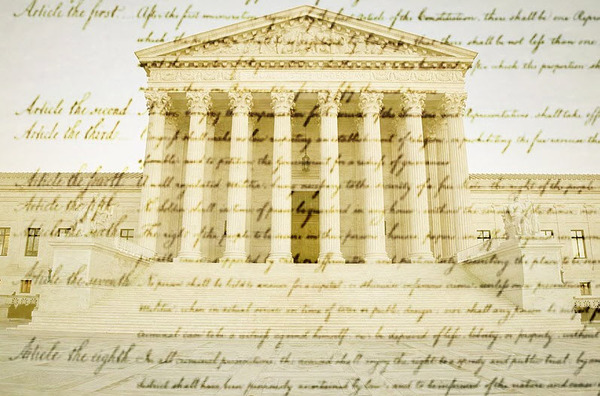
–>
July 11, 2022
The essence of this lesson is: Federalism is a basic structure of governance in the United States, U.S. Constitutional rights are limited, and some rights come from God, not government.
‘); googletag.cmd.push(function () { googletag.display(‘div-gpt-ad-1609268089992-0’); }); }
Supreme Courts of the United States like to bore down, relative to fundamental rights, to those that have historic recognition in the traditions and customs of the People. In other words, our system has a hierarchy of individual rights. That hierarchy is:
I. RIGHTS FROM GOD (UNALIENABLE; DECLARATION OF INDEPENDENCE, 1776)
A. life itself, the taking of which is conditioned by Moral Law first and then Positive Law
B. liberty of the person, conditioned on respecting the liberty of other persons
C. pursuit of happiness, conditioned on respecting other people’s pursuit of happiness
II. US CONSTITUTIONAL RIGHTS, 1787
A. the right to a trial by jury in criminal cases
B. the right to present oneself for trial – habeas corpus
C. the right not to have a religious test used as a condition of federal public service
D. the right not to be incriminated by a legislative body – bill of attainder
E. the right not to be indicted for a crime that was not illegal at the time – ex post facto law
F. the right to obligate oneself by contract
‘); googletag.cmd.push(function () { googletag.display(‘div-gpt-ad-1609270365559-0’); }); }
III. RIGHTS ADDED TO THE CONSTITUTION AS THE BILL OF RIGHTS, 1791
A. the right to exercise one’s religion and speak on issues of public policy in a proper forum
B. the right to peacefully assemble and petition the government for redress of grievances
C. the right to keep and bear arms
D. the right to be free from arbitrary search of one’s person and property
E. the right to a grand jury for a federal crime
F. the right not to be tried for the same offense twice
G. the right not to be compelled to testify against oneself
H. the right to due process if deprived of life, liberty, or property
I. the right not to have one’s property taken without just compensation
J. the right to a public, speedy, trial by an impartial jury where the crime was committed
K. the right to be informed of the accusation, to confront witnesses, to have counsel
L. the right to be free of cruel or unusual punishment or excessive bail
IV. US CONSTITUTIONAL RIGHTS IN SUBSEQUENT AMENDMENTS
A. the right to the privileges and immunities of national citizenship, due process for loss of life, liberty, or property, and equal protection of the law – the 14th Amendment (1868)
B. the right to vote – the 15th (1870), 19th (1920), 24th (1964), and 26th (1971) Amendments
V. STATE CONSTITUTIONAL RIGHTS VARY IN EACH STATE’S CONSTITUTION – example: the right to primary and secondary education is a right derived from each state, not the US Constitution

Image: United States Supreme Court collage made using a photo by Jesse Collins. CC BY 3.0.
Other than those rights that come from God and attach to us by our existence, most of the rights we cherish as Americans are political rights that define our relationship to the federal or state government and protect the primary value of our Constitutional Republic, which is personal liberty.
The Supreme Court in 1973 (Roe v. Wade) decided that the Due Process Clause of the 14th Amendment incorporated a Liberty interest in privacy that, while not expressly stated in the original document or its amendments, arose from emanations and penumbras of various parts of the Bill of Rights. (This is called Substantive Due Process.) Since the 14th Amendment applies to states, the Court decided that a law in Texas that banned abortion was unconstitutional as a violation of the mother’s privacy rights. The Roe decision, as the Supreme Positive Law of the Land, overturned all state abortion laws then in force.
Why did the current Supreme Court overturn a decision that has been the Law of the Land for fifty years?
‘); googletag.cmd.push(function () { googletag.display(‘div-gpt-ad-1609268078422-0’); }); } if (publir_show_ads) { document.write(“
The simple answer is that, in finding overarching new privacy rights for the mother, subsequent decisions such as Casey v. Planned Parenthood (1992), by using Roe as a building block, left out any rights whatsoever for the fetus. Abortion on demand, regardless of the gestation period, resulted in grisly executions of perfectly healthy human beings, something that is a clear moral issue this Court feels it cannot address.
What the Supreme Court did is to bring us back to one of the basic premises of our system: Federalism. Federalism is a “first principle” of our Constitutional Republic. It divides power between the national and state governments so that neither suffocates personal Liberty. State power, called Police Power, is plenary or broad regarding the health, welfare, and morals of the People residing within the state. The Court thinks this moral dilemma belongs there.
National power is supposed to be limited—it’s enumerated for that purpose—and national and international in concern. Rights and powers not delegated to the federal government are reserved for the states or to the People. Abortion is an issue that lends itself to this understanding.
Nothing prevents a state now from using the structure of rights outlined in Roe for its own state statute. Roe recognized the mother’s right to choose in the first three months of pregnancy; recognized shared rights with the state, fetus, and mother in the second three months of pregnancy; and then recognized fetal rights in the third three months of pregnancy.
The decision the Supreme Court made was not easy. No Court likes to admit mistakes in legal reasoning or structural understanding. This was an act of courage and a giant civics lesson for us all:
1. The Supreme Court is not a legislative body; it does not craft legislative law
2. The Supreme Court is to uphold first principles of our Constitutional governance system
3. Fundamental rights not within the country’s traditions, customs, and morals belong to the People themselves or codified as statutes through their elected representatives.
That the Supreme Court could admit error is a remarkable achievement in an era of growing governmental tyranny. It also signals respect for power that, in our system, rightly belongs to the People.
M.E. Boyd’s Apples of Gold – Voices From the Past that Speak to Us Now is available at www.amazon.com.
<!– if(page_width_onload <= 479) { document.write("
“); googletag.cmd.push(function() { googletag.display(‘div-gpt-ad-1345489840937-4’); }); } –> If you experience technical problems, please write to [email protected]
FOLLOW US ON
<!–
–>
<!– _qoptions={ qacct:”p-9bKF-NgTuSFM6″ }; ![]() –> <!—-> <!– var addthis_share = { email_template: “new_template” } –>
–> <!—-> <!– var addthis_share = { email_template: “new_template” } –>






